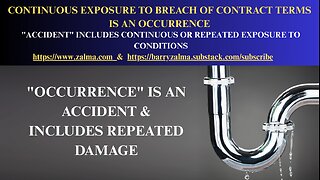Premium Only Content

Clear & Unambiguous Exclusion Effective
Death by Self-Administered Dialysis is Excluded
Post 5173
Clear & Unambiguous Exclusion Effective
Dana Kleinsteuber died while administering her own dialysis at home. MetLife now agrees that tragedy was an accident but refused to pay because of an exclusion for losses caused or contributed to by the treatment of a physical illness.
In Charles M. Kleinsteuber v. Metropolitan Life Insurance Company, CIVIL No. 23-3494 (JRT/DTS), United States District Court, D. Minnesota (August 19, 2025) the USDC was faced with the interpretation of an exclusion in an ERISA plan.
KEY FACTS:
Dana Kleinsteuber's Death:
Dana Kleinsteuber, diagnosed with end-stage renal disease (ESRD), was self-administering dialysis at home when she suffered acute blood loss and died. The cause of death was listed as ESRD and natural causes.
Insurance Claims:
Charles Kleinsteuber, Dana's husband, filed claims for both life insurance and accidental death and dismemberment (AD&D) insurance. MetLife approved the life insurance claim but denied the AD&D claim, stating that the death was not accidental and was caused by the treatment of ESRD.
Legal Action:
Charles Kleinsteuber filed an ERISA action to recover the AD&D benefit, arguing that Dana's death was accidental.
LEGAL POINTS:
Policy Exclusion:
The AD&D policy excluded coverage for losses caused or contributed to by the treatment of a physical illness. MetLife argued that Dana's death fell under this exclusion because it was related to her dialysis treatment.
Court's Analysis:
The court applied the abuse of discretion standard to determine if MetLife's interpretation of the policy exclusion was reasonable. The court considered several factors, including whether MetLife's interpretation was consistent with the goals of the plan, whether it rendered any language in the plan meaningless, and whether it conflicted with ERISA's substantive or procedural requirements.
To determine whether MetLife abused its discretion in denying the claim, the Court performed a two-step analysis, asking (1) whether the insurer's interpretation of the Plan language is reasonable, and (2) whether application of that interpretation to the facts is supported by substantial evidence.
The Policy excludes coverage when “treatment” of a physical illness “contributed to” the insured's “loss.” MetLife interprets that language to mean that a person who accidentally bleeds out from an open port during self-administered dialysis is excluded from coverage.
When determining reasonableness of an ERISA policy interpretation, courts will interpret consistently with the goals of the Plan. When an administrator has offered a reasonable interpretation, courts may not insert their own interpretation because under an abuse of discretion review, courts are not tasked with determining the best or preferable interpretation.
The primary goal of an AD&D plan is to provide an employees' benefit and welfare plan for its members. When paired with life insurance the goal is to increase the amount of recovery over the face amount of the policy when death is from an accident.
MetLife adequately explained the specific reasons for the denial in its initial denial letter. In that letter, MetLife explained that the death was not accidental because Dana's Death Certificate listed her death as resulting from ESRD and natural causes. It also stated that even if the death were an accident, the policy exclusion applied because the police report showed that Dana passed away from a medical emergency involving a dialysis machine.
MetLife, therefore, complied with the regulation requirements in issuing its initial denial.As long as there is substantial evidence to show that Dana's dialysis treatment contributed to her death, MetLife did not abuse its discretion in denying Kleinsteuber's claim.
CONCLUSION
The USDC found that MetLife did not abuse its discretion in determining that the dialysis treatment contributed to Dana's death, which triggered a policy exclusion. Therefore, the Court denied Kleinsteuber's Motion for Summary Judgment and granted MetLife's Motion for Summary Judgment.
The court found that MetLife did not abuse its discretion in denying the AD&D claim, as there was substantial evidence that Dana's dialysis treatment contributed to her death.
ZALMA OPINION
ERISA is a program created by federal law and is interpreted by federal courts. When there is a legitimate, clear and unambiguous requirement that the Accidental Death policy required that the death is accidental and the loss was not caused or contributed to by the treatment of a physical illness. Since dialysis is the treatment of an illness and contributed to the death the exclusion applied.
(c) 2025 Barry Zalma & ClaimSchool, Inc.
Please tell your friends and colleagues about this blog and the videos and let them subscribe to the blog and the videos.
Subscribe to my substack at https://barryzalma.substack.com/subscribe
Go to X @bzalma; Go to Barry Zalma videos at Rumble.com at https://rumble.com/account/content?type=all; Go to Barry Zalma on YouTube- https://www.youtube.com/channel/UCysiZklEtxZsSF9DfC0Expg; Go to the Insurance Claims Library – https://lnkd.in/gwEYk.
-
 8:02
8:02
Insurance Law
13 days agoContinuous Exposure to Breach of Contract Terms is an Occurrence
21 -
 23:28
23:28
DeVory Darkins
10 hours ago $10.50 earnedTrump official ANNIHILATES Democrats in heated debate as CNN gets caught sympathizing with criminals
21.3K71 -
 1:02:26
1:02:26
The Nick DiPaolo Show Channel
12 hours agoPOC Murders Another White Woman | The Nick Di Paolo Show #1790
57.5K71 -
 2:04:29
2:04:29
Inverted World Live
8 hours agoNew UFO Hearing Testimony: Lockheed Martin Has Alien Technology | Ep. 105
69.6K8 -
 5:00:59
5:00:59
Akademiks
6 hours agoYNW Melly MIGHT BE COOKED! Co-D TELLLING? 6ix9ine vs Young Thug . Drake vs Kaicenat? HOLLY
34.5K2 -
 4:46:45
4:46:45
Drew Hernandez
12 hours agoHORRIFYING: FULL FOOTAGE OF IRYNA ZARUTSKA MURDER HAS BEEN RELEASED
36.4K35 -
 2:42:09
2:42:09
TimcastIRL
8 hours agoNATO Scramble Air Force Over Russian Incursion Into Poland, HIGH ALERT Reported | Timcast IRL
183K113 -
 25:46
25:46
Man in America
12 hours agoALERT: Gold Prices FLASH OMINOUS WARNING for the Dollar—Are You READY??
39.8K17 -
 58:27
58:27
Sarah Westall
8 hours agoWar Exploding Around the World: Nepal, Israel, Qatar, Venezuela, Thailand, more... w/ Michael Yon
44.5K14 -

SpartakusLIVE
10 hours agoThe Most INSANE Snipes EVER || Solo to Duos w/ StevieT - PUBG or Mordor Later?!
59K1